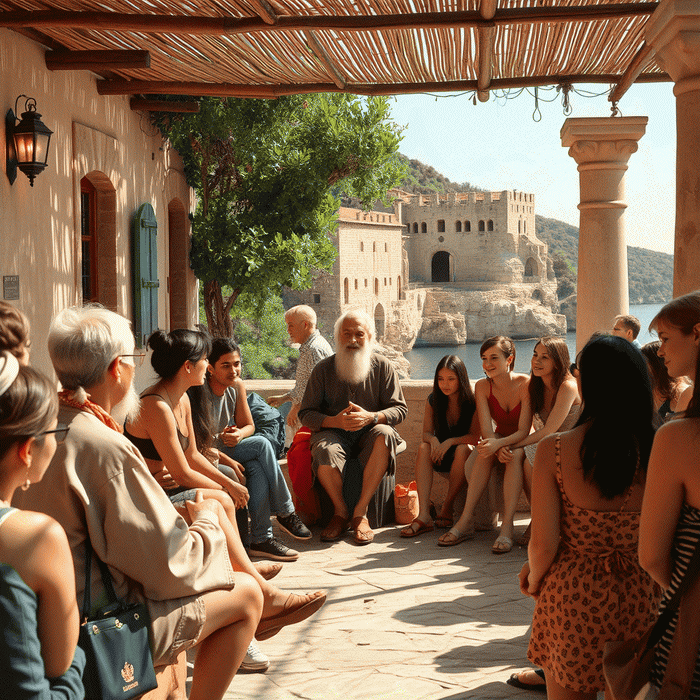Stoicism: the most modern of Ancient Philosophies

In a world constantly buzzing with distractions, pressures, and uncertainties, it’s easy to feel overwhelmed. The question of how to navigate life’s inevitable challenges isn’t a new one; it’s been asked for millennia. And one of the most enduring answers comes from an ancient source: Stoicism. Born in the lively streets of Athens and nurtured in the heart of the Roman Empire, Stoicism offers a profound yet practical philosophy, as relevant today as it was two thousand years ago.
The Birth of Stoicism: Zeno and the Greeks
Stoicism originated in the third century BCE, founded by Zeno of Citium, a man whose shipwrecked fortune led him to Athens—a city steeped in philosophy. There, in the open-air colonnade known as the Stoa Poikile, Zeno began to teach a philosophy that was deeply practical. Unlike other schools that might have focused on abstract metaphysics, Zeno’s teachings were rooted in the realities of daily life. The core idea? Virtue is the only true good, and it’s within our control. Everything else—wealth, health, status—can enhance our lives but doesn’t define our happiness.
Roman Stoicism: Seneca and Epictetus
As Stoicism traveled westward to Rome, it found new champions who adapted its principles to their unique contexts. Lucius Annaeus Seneca, a statesman and advisor to Emperor Nero, offered a version of Stoicism that grappled with the moral complexities of power and politics. In his letters and essays, Seneca emphasizes the importance of inner peace and resilience, advising his readers to maintain their moral integrity regardless of external circumstances. His famous quote, “We suffer more often in imagination than in reality,” is a reminder that much of our distress comes from how we perceive events rather than the events themselves.
Epictetus, a former slave turned philosopher, brought an even more practical approach to Stoicism. His teachings, recorded by his student Arrian, focus on what we can and cannot control. According to Epictetus, the key to a good life is to focus solely on our own actions and attitudes, letting go of any attachment to outcomes. His advice resonates strongly in our modern age: “It’s not what happens to you, but how you react to it that matters.”
Stoicism for Today: Ancient Wisdom, Modern Application
So, what makes Stoicism, an ancient philosophy, so modern? It’s the practicality. In a world filled with constant change and unforeseen challenges, the Stoic focus on personal responsibility, emotional resilience, and ethical living provides a timeless guide. Stoicism teaches us that while we can’t control external events, we can control how we respond. This is especially relevant today when we often feel overwhelmed by news, social media, and the demands of everyday life.
Stoicism isn’t about suppressing emotions or pretending that everything is fine when it isn’t. Instead, it’s about recognizing our emotions, understanding them, and deciding how best to act. It’s a philosophy of empowerment, encouraging us to live according to our values, regardless of what happens around us.
For example, when facing stress or adversity, a Stoic might ask, “Is this within my control?” If the answer is no, the Stoic response would be to let go of worry and focus instead on what can be controlled—our thoughts, our actions, our responses. This isn’t about passivity or resignation; it’s about directing our energy where it can be most effective.
Another central Stoic practice is premeditatio malorum, or the premeditation of evils. This involves mentally preparing for potential challenges or setbacks. By considering what might go wrong, Stoics believe we can reduce fear and anxiety, making us more resilient when difficulties arise. This practice is akin to modern psychological techniques used to manage anxiety, proving that Stoic wisdom remains relevant even in contemporary mental health practices.
Living Stoically: Practical Advice
How can we integrate Stoic principles into our lives today? It begins with mindfulness and reflection. Taking time each day to reflect on our actions and decisions, as well as our responses to the day’s events, is a key Stoic practice. This could be as simple as journaling in the evening or starting the day with a moment of quiet contemplation.
Another practical application of Stoicism is learning to distinguish between what we can control and what we cannot. In a world where we are constantly bombarded with information and opinions, it’s easy to get caught up in things beyond our influence. By focusing on our own thoughts and behaviors, we can cultivate a sense of inner peace and purpose, regardless of external circumstances.
Finally, Stoicism encourages us to live in accordance with our values. This means acting with integrity, even when it’s difficult, and striving to be the best version of ourselves in every situation. By doing so, we not only improve our own lives but also contribute positively to the lives of others.
Stoicism’s Timeless Appeal
In a time when modern life often feels chaotic and uncontrollable, Stoicism offers a beacon of stability and clarity. It’s a philosophy that speaks directly to our deepest concerns—how to live a good life, how to find peace amidst turmoil, and how to navigate the challenges of existence with grace and wisdom.
By embracing Stoic principles, we can cultivate resilience, focus on what truly matters, and live in harmony with the world around us. In this way, Stoicism proves itself not just a relic of ancient thought, but a living, breathing philosophy for our modern age.


